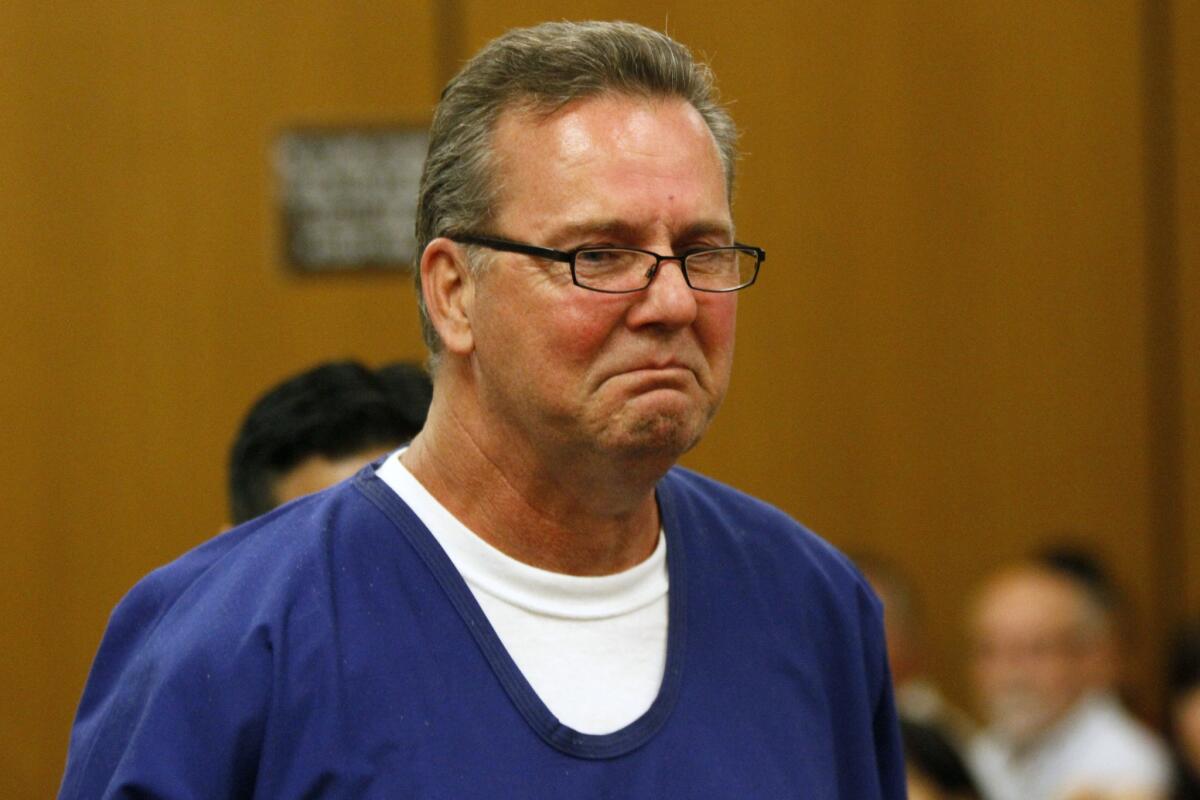2 wrongfully convicted men can sue L.A. County, appeals court rules

A federal appeals panel on Wednesday unanimously found that Frank O’Connell, shown in 2012, and another man may sue Los Angeles County after deputies failed to turn over exonerating evidence and the men were wrongfully convicted of crimes.
- Share via
Reporting from San Francisco — Two men wrongfully imprisoned for decades may hold Los Angeles County sheriff’s detectives and a deputy liable for failing to disclose evidence that pointed toward their innocence, a federal appeals panel unanimously decided Wednesday.
In a decision written by Judge Raymond C. Fisher, a Clinton appointee, the three-judge panel said the law was clear during the sheriff’s investigations that police were required to turn over exonerating evidence.
Judges Jay S. Bybee and Carlos T. Bea, both appointed by former President George W. Bush, joined in the decision.
Frank O’Connell, convicted of killing Jay French in 1984, won his release in 2012 after spending 27 years behind bars. L.A. County Superior Court Judge Suzette Clover found that sheriff’s detectives had failed to disclose exonerating information to either the prosecution or the defense.
O’Connell later sued former Los Angeles County Sheriff’s Department homicide detectives J.D. Smith and Gilbert Parra, alleging that they had refused to reveal evidence impeaching the statements of three eyewitnesses as well as information about a previous attempt on the victim’s life.
Francisco Carrillo Jr., in a separate lawsuit, also said the department failed to disclose information about the reliability of an eyewitness in his case. Eyewitness testimony is a leading cause of wrongful convictions.
Carrillo was convicted of killing Donald Sarpy in a 1991 drive-by shooting. Carrillo was 16 at the time and served 20 years in prison.
In his lawsuit, Carrillo charged that former Deputy Craig Ditsch knew that an eyewitness had trouble identifying Carrillo and tried to pressure the witness when he decided to recant.
L.A. County Superior Court Judge Paul A. Bacigalupo ordered Carrillo’s release in 2011 after concluding the eyewitness testimony against him was false, tainted or both.
Attorneys for the sheriff’s employees argued that the lawsuits should be dismissed because the law was unclear in 1984 and 1991 as to whether police had to disclose evidence exonerating innocence.
Members of law enforcement have immunity from lawsuits when their actions did not violate an established law.
The 9th Circuit, citing Brady vs. Maryland, the 1963 Supreme Court decision that required disclosure of exculpatory evidence, said the authorities should have known of the requirement.
“The law at the time of the investigations clearly established that police officers had to disclose material, exculpatory evidence under Brady, and second, that any reasonable officer would have understood that Brady required the disclosure of the specific evidence allegedly withheld,” Fisher wrote.
Ron Kaye, a lawyer for Carrillo, said his client and O’Connell are thriving outside prison. Carrillo is getting a college degree, and O’Connell has been working and spending time with his son, who also is a party to the case, according to the lawyer.
Kaye said he does not believe the three sheriff’s employees were ever disciplined. Parra has since died, and the other two retired, Kaye said.
“Both Mr. Carrillo and Mr. O’Connell are innocent men who have had some of the most important years of their life stolen from them by law enforcement officers who withheld critical evidence that would have led to their acquittals,” said Kaye, whose partner, Barrett Litt, represents O’Connell.
Questions to a law firm representing the former sheriff’s employees were referred to Los Angeles County Deputy County Counsel Jonathan McCaverty. Typically, the county pays for the defense of sheriff’s employees who are sued for on-the-job actions and for any judgment that results. McCaverty could not be reached for comment.
Twitter: @mauradolan
ALSO:
Police investigate daytime double killing in South L.A.
Los Angeles City Council delays vote on bid for 2024 Olympics
L.A. council candidate starts paying $91,000 fine for bogus donor information
More to Read
Sign up for Essential California
The most important California stories and recommendations in your inbox every morning.
You may occasionally receive promotional content from the Los Angeles Times.














